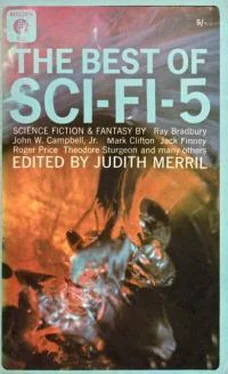The Best of Sci-Fi-5
Здесь есть возможность читать онлайн «The Best of Sci-Fi-5» весь текст электронной книги совершенно бесплатно (целиком полную версию без сокращений). В некоторых случаях можно слушать аудио, скачать через торрент в формате fb2 и присутствует краткое содержание. Год выпуска: 1966, Издательство: Mayflower-Dell, Жанр: Фантастика и фэнтези, на английском языке. Описание произведения, (предисловие) а так же отзывы посетителей доступны на портале библиотеки ЛибКат.
- Название:The Best of Sci-Fi-5
- Автор:
- Издательство:Mayflower-Dell
- Жанр:
- Год:1966
- ISBN:нет данных
- Рейтинг книги:3 / 5. Голосов: 1
-
Избранное:Добавить в избранное
- Отзывы:
-
Ваша оценка:
- 60
- 1
- 2
- 3
- 4
- 5
The Best of Sci-Fi-5: краткое содержание, описание и аннотация
Предлагаем к чтению аннотацию, описание, краткое содержание или предисловие (зависит от того, что написал сам автор книги «The Best of Sci-Fi-5»). Если вы не нашли необходимую информацию о книге — напишите в комментариях, мы постараемся отыскать её.
The Best of Sci-Fi-5 — читать онлайн бесплатно полную книгу (весь текст) целиком
Ниже представлен текст книги, разбитый по страницам. Система сохранения места последней прочитанной страницы, позволяет с удобством читать онлайн бесплатно книгу «The Best of Sci-Fi-5», без необходимости каждый раз заново искать на чём Вы остановились. Поставьте закладку, и сможете в любой момент перейти на страницу, на которой закончили чтение.
Интервал:
Закладка:
Instead, he became homesick.
Home. It was a little place he knew and loved. He could no longer stand the alien environment around him; it was repugnant, repelling. All he could think of was a little room, a familiar room, a beloved room. He knew the cracks in its ceiling, the feel of the varnish on the homely little desk, the touch of the worn carpet against his feet, the very smell of the air itself. And he loved them and longed for them with all the emotional power that was in him.
And suddenly the darkness of the smoke-filled prison apartment was gone.
Spencer Candron stood in the middle of the little hotel room he had rented early that morning. In his arms, he held the unconscious figure of Dr. James Ch’ien.
He gasped for breath, then, with an effort, he stooped, allowed the limp body of the physicist to collapse over his shoulder, and stood straight again, carrying the man like a sack of potatoes. He went to the door of the room and opened it carefully. The hall was empty. Quickly, he moved outside, closing the door behind him, and headed toward the stair. This time, he dared not trust the elevator shaft. The hotel only boasted one elevator, and it might be used at any time. Instead, he allowed his dislike for the stair treads to adjust his weight to a few pounds, and then ran up them two at a time.
On the roof of the hotel, he adjusted his emotional state once more, and he and his sleeping burden drifted off into the night, toward the sea.
No mind is infinitely flexible, infinitely malleable, infinitely capable of taking punishment, just as no material substance, however constructed, is capable of absorbing the energies brought to bear against it indefinitely.
A man can hate with a virulent hatred, but unless time is allowed to dull and soothe that hatred, the mind holding it will become corroded and cease to function properly, just as a machine of the finest steel will become corroded and begin to fail if it is drenched with acid or exposed to the violence of an oxidizing atmosphere.
The human mind can insulate itself, for a time, against the destructive effects of any emotion, be it hatred, greed, despondency, contentment, happiness, pleasure, anger, fear, lust, boredom, euphoria, determination, or any other of the myriads of “ills” that man’s mind—and thus his flesh—is heir to. As long as a mind is capable of changing from one to another, to rotate its crops, so to speak, the insulation will remain effective, and the mind will remain undamaged. But any single emotional element, held for too long, will break down the resistance of the natural insulation and begin to damage the mind.
Even that least virulent of emotions, love, can destroy. The hot, passionate love between new lovers must be modified or it will kill. Only when its many facets can be shifted around, now one and now the other coming into play, can love be endured for any great length of time.
Possibly the greatest difference between the sane and the unsane is that the sane know when to release a destructive-force before it does more than minimal damage; to modify or eliminate an emotional condition before it becomes a deadly compulsion; to replace one set of concepts with another when it becomes necessary to do so; to recognize that point when the mind must change its outlook or die. To stop the erosion, in other words, before it becomes so great that it cannot be repaired.
For the human mind cannot contain any emotion, no matter how weak or how fleeting, without change. And the point at which that change ceases to be con structive and becomes, instead, de structive— that is the ultimate point beyond which no human mind can go without forcing a change— any change—in itself.
Spencer Candron knew that. To overuse the psionic powers of the human mind is as dangerous as overusing morphine or alcohol. There are limits to mental powers, even as there are limits to physical powers.
Psychokinesis is defined as the ability of a human mind to move, no matter how slightly, a physical object by means of psionic application alone. In theory, then, one could move planets, stars, even whole galaxies by thought alone. But, in physical terms, the limit is easily seen. Physically, it would be theoretically possible to destroy the sun if one had enough atomic energy available, but that would require the energy of another sun—or more. And, at that point, the Law of Diminishing Returns comes into operation. If you don’t want a bomb to explode, but the only way to destroy that bomb is by blowing it up with another bomb of equal power, where is the gain?
And if the total mental power required to move a planet is greater than any single human mind can endure—or even greater than the total mental endurance of a thousand planetsfull of minds, is there any gain?
There is not, and can never be, a system without limits, and the human mind is a system which obeys that law.
None the less, Spencer Candron kept his mind on flight, on repulsion, on movement, as long as he could. He was perfectly willing to destroy his own mind for a purpose, but he had no intention of destroying it uselessly. He didn’t know how long he kept moving eastward; he had no way of knowing how much distance he had covered nor how long it had taken him. But, somewhere out over the smoothly undulating surface of the Pacific, he realized that he was approaching his limit. And, a few seconds later, he detected the presence of men beneath the sea.
He knew they were due to rise an hour before dawn, but he had no idea how long that would be. He had lost all track of time. He had been keeping his mind on controlling his altitude and motion, and, at the same time, been careful to see whether Dr. Ch’ien came out of his unconscious state. Twice more he had had to strike the physicist to keep him out cold, and he didn’t want to do it again.
So, when he sensed the presence of the American submarine beneath the waves, he sank gratefully into the water, changing the erosive power of the emotion that had carried him so far, and relaxing into the simple physical routine of keeping both himself and Ch’ien afloat.
By the time the submarine surfaced a dozen yards away, Spencer Candron was both physically and mentally exhausted. He yelled at the top of his lungs, and then held on to consciousness just long enough to be rescued.
“The official story,” said Senator Kerotski, “is that an impostor had taken Dr. Ch’ien’s place before he ever left the United States—” He grinned. “At least, the substitution took place before the delegates reached China. So the ‘assassination’ was really no assassination at all. Ch’ien was kidnaped here, and a double put in his place in Peiping. That absolves both us and the Chinese Government of any complicity. We save face for them, and they save face for us. Since he turned up here, in the States, it’s obvious that he couldn’t have been in China.” He chuckled, but there was no mirth in it. “So the cold war still continues. We know what they did, and—in a way—they know what we did. But not how we did it.”
The senator looked at the other two men who were with him on the fifth floor office of the Society for Mystical and Metaphysical Research . Taggert was relaxing on his couch, and Spencer Candron, just out of the hospital, looked rather pale as he sat in the big, soft chair that Taggert had provided.
The senator looked at Candron. “The thing I don’t understand is, why was it necessary to knock out Ch’ien? He’ll have a sore jaw for weeks. Why didn’t you just tell him who you were and what you were up to?”
Candron glanced at Taggert, but Taggert just grinned and nodded.
“We couldn’t allow that,” said Candron, looking at Senator Kerotski. “Dr. James Ch’ien has too much of a logical, scientific mind for that. We’d have ruined him if he’d seen me in action.”
Читать дальшеИнтервал:
Закладка:
Похожие книги на «The Best of Sci-Fi-5»
Представляем Вашему вниманию похожие книги на «The Best of Sci-Fi-5» списком для выбора. Мы отобрали схожую по названию и смыслу литературу в надежде предоставить читателям больше вариантов отыскать новые, интересные, ещё непрочитанные произведения.
Обсуждение, отзывы о книге «The Best of Sci-Fi-5» и просто собственные мнения читателей. Оставьте ваши комментарии, напишите, что Вы думаете о произведении, его смысле или главных героях. Укажите что конкретно понравилось, а что нет, и почему Вы так считаете.












